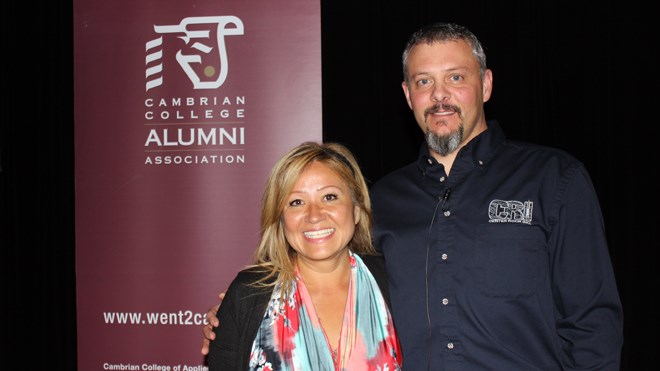When Suzanne Bernier watched the coverage of Hurricane Katrina in 2005, she saw death, devastation and destruction. When she landed on the ground in her role as a crisis management consultant, she quickly realized the reports had left something out.
The next time you hear about a disaster – in the paper or on TV – Bernier wants you to do something that will brighten your outlook, just a little.
“Look for the helpers, make it a game," said Bernier. "We're so focused on seeing those bad images we forget to see the helpers.”
The Cambrian graduate wrote a book about these helpers last year, “Disaster Heroes: Invisible Champions of Help, Hope and Healing.” On Wednesday night, she introduced one of her heroes to the college's packed auditorium.
In August 2010, 33 miners were trapped under 2,300 feet of hard rock in Chile. They weren't found for 17 days, and it took another 52 days before the miners made it to the surface.
When disaster struck, Brandon Fisher was doing business as usual in Pennsylvania, running his drilling company, Center Rock. When news spread stateside the 33 miners had been found alive, but were trapped deep below the Earth’s surface, the driller jumped into action.
Fisher and his crew headed to Chile and spent 39 days in the desert developing a plan to turn a five-inch shaft down to the miners into a 28-inch hole through which to pull them up. They were Plan B — Plan A could have taken until Christmas.
"Nothing's impossible, but it was very close to it,” said Fisher.
His team faced broken equipment, navigating twisted shafts and barriers stronger than rock, including roof beams and wire around the refuge sheltering the men.
But Fisher wasn't working alone. Equipment manufacturers turned out specialized drill bits for them in 36 hours, a process that usually takes weeks. UPS donated their transport services to get more than 50,000 pounds of equipment down to Chile, a service valued at more than $300,000.
Finally, after 39 days of drilling, Fisher's team got through to the men underground.
"I can't put into words how we felt — out there for 39 days, problem after problem,” said Fisher. “It was such a sense of relief. You can hear these bits coming for hours and hours, I can only imagine what they were feeling, hoping it would hit."
Bernier hopes stories like Fishers will inspire regular people and give some credit to crisis responders.
"I wanted to tell people about the great things people are doing behind the scenes," said Bernier. "Everyday people to inspire everyday people, to show you don't need a badge to be a hero."
Join Sudbury.com+
- Messages
- Post a Listing
- Your Listings
- Your Profile
- Your Subscriptions
- Your Likes
- Your Business
- Support Local News
- Payment History
Sudbury.com+ members
Already a +member?
Not a +member?
Sign up for a Sudbury.com+ account for instant access to upcoming contests, local offers, auctions and so much more.
